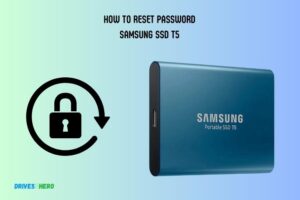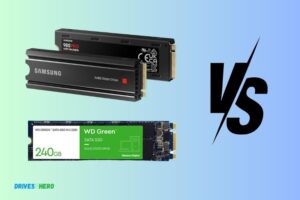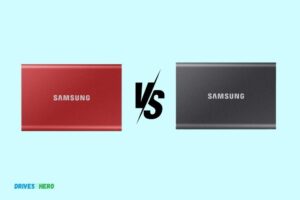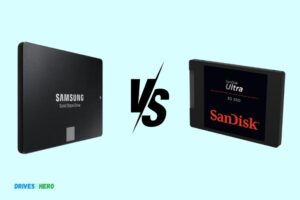Adata Vs Samsung Ssd M.2: Comparison!
Both ADATA and Samsung SSD M.2 drives offer high-speed performance and reliable storage solutions.
However, Samsung SSD M.2 generally has a higher read and write speed, making it more suitable for intensive tasks such as gaming, video editing, and multitasking.
Although, ADATA SSD M.2 offers competitive pricing and good performance, which might be more suitable for casual users.
The differences between ADATA and Samsung SSD M.2 drives come down to two main factors: speed and price. Samsung’s SSD M.2 drives tend to have faster read and write speeds, which is crucial for tasks that require the quick transfer of large amounts of data.
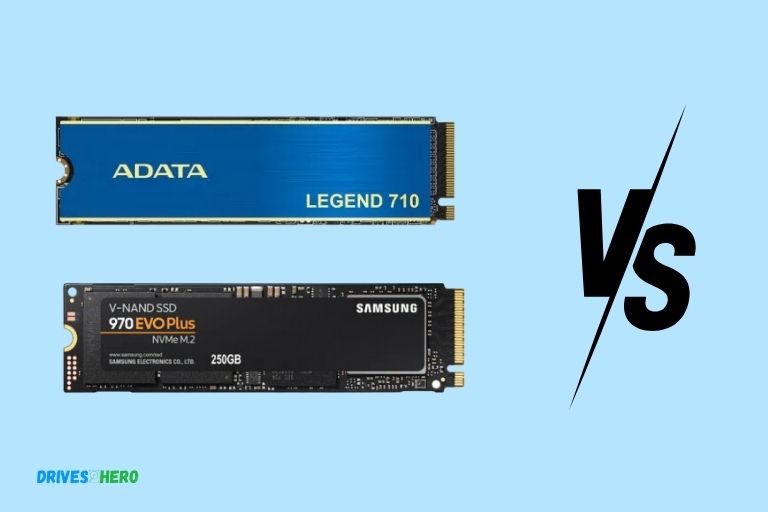
Key Takeaway
10 Features Of Adata Vs Samsung SSD M.2
| Features | ADATA SSD M.2 | Samsung SSD M.2 |
|---|---|---|
| Storage Capacity | 256GB, 512GB, 1TB, 2TB | 250GB, 500GB, 1TB, 2TB, 4TB |
| Sequential Read Speed | Up to 3500MB/s | Up to 3500MB/s |
| Sequential Write Speed | Up to 3000MB/s | Up to 3300MB/s |
| Interface | PCIe Gen3x4 | PCIe Gen3x4 |
| Durability (TBW) | Up to 1600 TBW | Up to 2400 TBW |
| Warranty | 5 years | 5 years |
| NAND Type | 3D NAND | V-NAND |
| Form Factor | M.2 2280 | M.2 2280 |
| Power Consumption | 0.33W Active (Typical) | 0.03W Idle, Max. 5.5W (Burst) |
| Price | Varies by capacity, often less expensive | Varies by capacity, often more expensive |
Performance Comparison
Comparing the performance of Adata and Samsung SSD M. 2 unveils their remarkable speed and reliability.
Adata M.2 Ssds: Speed, Reliability, And Performance Benchmarks
Here are some notable points to help you understand the performance of Adata M.2 SSDs:
Sequential Read/Write Speed: Adata M.2 SSDs offer impressive sequential read/write speeds, allowing for fast data access and transfers. With their high-speed performance, you can expect quicker boot times and reduced loading times for applications and files.
Random IOPS: Adata M.2 SSDs also excel in random IOPS (Input/Output Operations Per Second), which determines how quickly a storage device can process random read and write requests. Higher IOPS values mean smoother multitasking and better overall system responsiveness.
Reliability: Adata is known for producing SSDs that are built to last. Their M.2 SSDs are designed with features such as advanced error correction code and wear-leveling algorithms, ensuring the longevity and stability of your data storage.
Performance Benchmarks: Various performance benchmark tests have demonstrated the capabilities of Adata M.2 SSDs. These tests measure factors like speed, sequential and random read/write performance, and latency.
Adata M.2 SSDs consistently deliver impressive results in these tests, making them a reliable choice for users seeking high-performance storage solutions.
Samsung M.2 Ssds: A Closer Look At Their Performance Metrics
Here are some noteworthy details about Samsung M. 2 SSDs:
Sequential Read/Write Speed: Samsung M.2 SSDs showcase exceptional sequential read/write speeds, ensuring fast data transfers and improved system responsiveness. With these SSDs, you can experience enhanced performance when working with large files or running demanding applications.
Random IOPS: Samsung M.2 SSDs shine in random IOPS performance as well. Their high IOPS values enable optimal multitasking capabilities, allowing your system to handle multiple tasks simultaneously without significant performance degradation.
Reliability: Samsung’s reputation for reliability extends to their M.2 SSDs as well. These SSDs incorporate advanced technologies to mitigate data errors, protect against data loss, and maintain long-term data integrity.
Performance Benchmarks: Samsung M.2 SSDs have consistently performed well in various performance benchmark tests. These tests evaluate factors such as read/write speeds, IOPS, and overall system performance.
Samsung’s SSDs consistently receive high ratings, positioning them as top contenders in the market.
Adata Vs Samsung: Head-To-Head Performance Analysis
Here’s how they stack up against each other:
- Speed: Both Adata and Samsung offer M.2 SSDs with impressive speed capabilities. While Adata SSDs excel in sequential read/write speeds, Samsung SSDs also showcase exceptional speeds, ensuring smooth operation under heavy workloads.
- Reliability: Both brands are known for their reliable SSDs. Adata employs advanced error correction codes and wear-leveling algorithms to enhance data integrity, while Samsung incorporates their own technologies to ensure data security and long-term reliability.
- Performance Benchmarks: Adata and Samsung M.2 SSDs have consistently performed well in benchmark tests. It’s important to consider individual models and compare their respective performance metrics for a more accurate analysis.
Both Adata and Samsung offer high-performance M. 2 SSDs with impressive speed, reliability, and performance benchmarks.
Reliability And Durability
Adata and Samsung SSD M. 2 offer exceptional reliability and durability, ensuring long-lasting performance and peace of mind. These SSDs are built to withstand heavy use and deliver consistent results for your storage needs.
Adata M.2 Ssds: Reliability Features And Endurance Ratings
Here are the key aspects that contribute to their reliability and endurance:
Advanced Error Correction: Adata SSDs come equipped with advanced error correction technology, ensuring the integrity and accuracy of your data by detecting and correcting any errors that may occur during data transmission or storage.
Wear Leveling: These SSDs employ wear leveling algorithms that evenly distribute write and erase operations across memory cells. This helps prevent any specific cells from being overused, extending the drive’s lifespan and maintaining its performance over time.
SLC Caching: By utilizing SLC (Single-Level Cell) caching, Adata SSDs can deliver faster and more reliable performance. SLC caching technology temporarily stores frequently accessed data in a faster memory buffer, resulting in improved overall responsiveness.
Endurance Ratings: Adata M.2 SSDs feature impressive endurance ratings, indicating their ability to withstand continuous read and write operations without compromising performance.
Samsung M.2 Ssds: Assessing Their Durability And Long-Term Performance
Take a look at the key factors that contribute to their reliability:
V-NAND Technology: Samsung utilizes its proprietary V-NAND technology, which stacks memory cells vertically to achieve higher density and improved endurance. This technology allows Samsung SSDs to handle intensive workloads and maintain reliable performance over an extended period.
Dynamic Thermal Guard: Samsung’s SSDs are equipped with a dynamic thermal guard feature that actively monitors and regulates the temperature. This ensures optimal operating conditions, preventing overheating and potential performance degradation.
TRIM Support: Samsung SSDs support TRIM, a command that allows the operating system to inform the SSD which data blocks are no longer in use. This optimization process helps maintain peak performance and extends the lifespan of the drive.
Enhanced Data Security: Samsung SSDs implement various encryption methods, including AES 256-bit hardware-based encryption, to secure your data from unauthorized access. This added layer of protection enhances the overall reliability and durability of the drive.
Adata Vs Samsung: Which Brand Offers Better Reliability?
Here’s a brief comparison to help you make an informed decision:
- Adata SSDs excel in terms of advanced error correction and wear leveling algorithms. These features contribute to their long-term reliability and endurance, making them suitable for heavy workloads.
- On the other hand, Samsung SSDs stand out with their V-NAND technology and dynamic thermal guard, ensuring durability and optimal performance even under challenging conditions.
Ultimately, determining which brand offers better reliability depends on your specific needs. Adata excels in error correction and wear leveling, while Samsung impresses with V-NAND technology and dynamic thermal regulation.
Choosing The Right M.2 SSD
When choosing between Adata and Samsung SSD M. 2 drives, the final verdict depends on factors like performance, reliability, and price.
Factors To Consider When Making A Decision Between Adata And Samsung M.2 Ssds:
Performance: Both Adata and Samsung offer high-performance M.2 SSDs, but it’s essential to compare their read and write speeds as well as their random access performance. Consider the specific requirements of your tasks, such as gaming, content creation, or data-intensive applications.
Reliability: Evaluate the track record of Adata and Samsung in terms of product reliability and durability. Look for information on their warranties, mean time between failures (MTBF), and any customer feedback about device failures.
Compatibility: Ensure that the SSD you choose is compatible with your system, motherboard, and M.2 slot type. Check whether the SSD supports the latest NVMe protocol, as this will provide optimal performance and faster data transfer speeds.
Capacity options: Determine the amount of storage space you require. Adata and Samsung typically offer various capacity options, so consider your needs both in the present and in the long term.
Price: Compare the prices of Adata and Samsung SSDs within similar performance and capacity ranges. Consider any additional features or software that may be bundled with the SSDs to determine their overall value.
Personal Preferences And Use Cases In Selecting The Ideal M.2 Ssd:
- Gaming: If you are a passionate gamer, prioritize an M.2 SSD with fast read and write speeds to reduce game loading times. Look for models with large cache sizes to improve overall gaming performance.
- Content creation: For professionals working with media files, such as video editing or 3D rendering, a reliable and fast M.2 SSD is crucial. Opt for models with high-capacity options and comprehensive error correction technologies to safeguard your valuable projects.
- General use: If you are seeking an M.2 SSD for everyday computing needs, a balance between performance and cost-effectiveness is ideal. Consider models with sufficient capacity for your operating system, applications, and frequently accessed files.
Adata Vs Samsung: The Ultimate Choice For Your Storage Needs
Adata M.2 SSDs: Adata offers a range of M.2 SSDs that excel in performance and affordability. With competitive read and write speeds, these SSDs are suitable for various purposes, including gaming, content creation, and everyday computing.
Samsung M.2 SSDs: Samsung consistently delivers top-notch M.2 SSDs that combine exceptional performance and reliability. Their SSDs often exhibit faster read and write speeds, making them ideal for demanding tasks like gaming, multimedia editing, and professional use.
Although generally pricier compared to Adata, Samsung’s reputation for quality and innovation puts them at the forefront of the market.
Conclusion
Both Adata and Samsung Ssd M. 2 offer exceptional performance and reliability in the world of solid-state drives (SSDs). Whether you choose Adata or Samsung, you can expect lightning-fast boot times, rapid data transfers, and improved overall system responsiveness.
Both brands have a strong reputation in the market, and choosing between them mainly comes down to personal preference and budget.
If you are looking for affordability without compromising on performance, Adata SSDs are a fantastic option. They offer competitive speeds and a wide range of storage capacities to meet your needs.
On the other hand, if you prioritize top-tier performance and have a larger budget, Samsung Ssd M. 2 drives excel in delivering lightning-fast speeds, exceptional endurance, and superior technology advancements.

